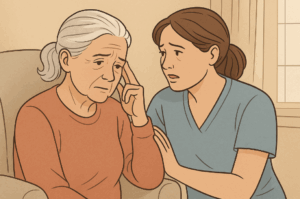Vascular Dementia: A Practical Guide for Caregivers
 Why Caregivers Matter Most
Why Caregivers Matter Most
When a loved one is diagnosed with vascular dementia, it is not just their life that changes — yours does too. Unlike Alzheimer’s, vascular dementia often follows a stepwise decline after strokes or mini-strokes. This means sudden losses in memory, judgment, or mobility can catch families off guard. Caregivers play a central role in keeping patients safe, independent for as long as possible, and emotionally supported.
1. Understanding the Symptoms
-
Thinking and memory: slowed processing, poor planning, difficulty multitasking, memory lapses.
-
Behavior and mood: irritability, depression, apathy, emotional ups and downs.
-
Physical signs: unsteady gait, weakness, slurred speech after strokes.
💡 Tip for caregivers: If you notice sudden new changes in behavior or memory, it may signal another stroke — seek medical help immediately.
2. Medical Care and Risk Factor Management
-
Ensure regular monitoring of blood pressure, blood sugar, and cholesterol.
-
Encourage a heart-healthy diet: less salt, more fruits and vegetables.
-
Make sure medications are taken consistently — missed doses can increase stroke risk.
-
Help your loved one stay physically active within safe limits.
3. Supporting Daily Life
-
Structure and routine: predictable schedules reduce confusion.
-
Simplify tasks: break activities into smaller steps.
-
Safe environment: remove tripping hazards, keep rooms well lit.
-
Memory aids: calendars, sticky notes, pill organizers.
4. Managing Emotional and Behavioral Changes
-
Depression: look out for loss of interest, sleep or appetite changes. Early treatment with counseling or SSRIs can help.
-
Apathy: gentle prompting and engaging in favorite activities.
-
Agitation or aggression: stay calm, redirect attention, avoid confrontation.
-
Emotional lability (sudden crying/laughing): reassure gently; it is a neurological symptom, not intentional behavior.
5. Caring for Yourself as a Caregiver
-
Vascular dementia caregiving is often a marathon, not a sprint.
-
Join support groups — many caregivers find relief in shared experiences.
-
Take regular breaks; respite care can prevent burnout.
-
Watch your own health — stress, sleep loss, and depression are common in caregivers.
6. When to Seek Immediate Help
-
Sudden worsening of symptoms (possible new stroke).
-
Severe behavioral changes posing danger to self or others.
-
Inability to care for the patient at home safely.
Key Takeaway
Caring for someone with vascular dementia requires patience, structure, and medical vigilance. Small steps — like ensuring medication adherence or creating a calm daily routine — can significantly improve quality of life for both patient and caregiver. And remember, you don’t have to do it alone. Support is available, and asking for help is part of good caregiving.
About the Author
Dr. Srinivas Rajkumar T
Consultant Psychiatrist
Apollo Clinic, Velachery, Chennai
📞 85951 55808